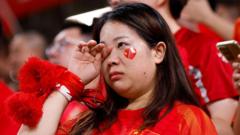On a sweltering night in Saitama, Japan, the Chinese national football team faced their darkest moment ever, succumbing to a staggering 7-0 defeat in a World Cup qualifier against Japan. With a minute remaining and trailing hopelessly, the Chinese players could only watch as Takefusa Kubo, dubbed "Japanese Messi," scored yet another goal, inflicting a new level of humiliation. This catastrophic loss, described by a Shanghai newspaper as "rock-bottom," followed a series of disheartening defeats to teams like Oman and Hong Kong.
The aftermath saw a sweeping corruption investigation that resulted in the arrest of numerous players, coaches, and officials involved in match-fixing and gambling scandals, further crippling the beleaguered sport in the nation. China's recent failure to Australia reinforced their position as the bottom team in their World Cup qualifying group, marking a decline from previous ambitions.
Since taking office in 2012, President Xi Jinping has dreamt of turning China into a football powerhouse, aspiring for the nation to not only qualify for the World Cup but also to host and eventually win the tournament. However, a decade later, even Xi hinted at a diminishing optimism regarding the future of the national team. A seemingly casual remark about "getting lucky" in a recent match epitomizes the growing disenchantment surrounding the sport.
Various sports commentators highlight that the rigid, top-down structure of China's unique political system has stifled the organic growth of football, making it difficult for the sport to flourish. The Chinese Football Association’s current leadership is deeply intertwined with the Communist Party, leading to decisions from officials without any footballing background. This obstruction impedes the grassroots development vital for building a robust football culture.
The dire statistics reveal the imbalances: while England has over 1.3 million registered players, China's numbers hover below 100,000, despite a population 20 times larger. The sports culture thrives more around organized and bureaucratic structures instead of grassroots enthusiasm. Since professional leagues were established only in the 1990s with concentrated investments in a few major cities, grassroots football remains neglected.
In contrast, countries with strong football traditions have fostered their sports over decades, allowing communities to build a solid foundation for player development. The downtrend in investments and focus on football, compounded by the pandemic, has seen over 40 clubs folding and the dissolution of key teams like Jiangsu FC and Guangzhou Evergrande who once dominated the league.
Corruption within the sport has illuminated the issue of mismanagement. Former national team manager Li Tie publicly admitted to bribery and match-fixing, further complicating the already deteriorating landscape of Chinese football. The struggles in this domain highlight an unsettling contrast to China's overall success in individual sports, which thrive due to less complex management requirements.
As the economy wrestles with slow growth and ongoing challenges, football fans face a difficult reality. The stinging lament follows the defeat to Japan, encapsulated by a statement from a major Chinese newspaper indicating the shift from disappointment to detached numbness. Despite the wealth of potential and passion for the sport, without substantive changes, the narrative of Chinese football remains one of struggle, overshadowed by dashed hopes and systemic flaws.





















